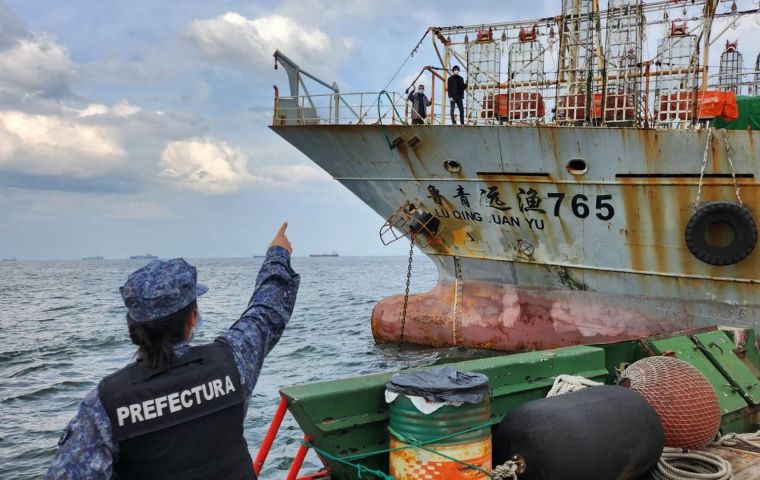MercoPress. South Atlantic News Agency
Chinese fishing fleet raises concerns in Chile
 The Chinese fleet is not retreating; it is merely reorganizing
The Chinese fleet is not retreating; it is merely reorganizing The presence of the Chinese fishing fleet off the Pacific coast of South America has evolved to a permanent event, its structural operation dramatically reshaping geopolitical and environmental balances in Chile.
Satellite imagery and expert testimony would indicate that China is increasingly using Chile as a new logistical hub, displacing former key ports that implemented stricter controls. For over a decade, the Chinese operation has intensified, driven by state subsidies and questionable practices, leading to a sustained increase in fishing effort.
Montevideo, once a major logistical center in the South Atlantic, saw its annual intake of Chinese vessels drop from over 300 to about 140 following an industrial accident that limited dry dock capacity and a general move toward stricter controls.
Following the detection of illegal fishing in 2018, Peru implemented mandatory state-provided satellite tracking. China —which resists independent tracking mechanisms— responded by ceasing use of Peruvian ports. Peru subsequently tightened rules again in 2024, closing the door entirely to the non-transparent fleet.
In this scenario, these closures have been filled by Chile, particularly in its northern ports like Arica and Iquique. In the first half of the year, Chile went from zero port entries by the Chinese fleet in 2023 to more than two dozen in 2024, while entries in Peru dropped from 61 to zero.
“China only uses ports that do not control them,” marine conservation specialist Milko Schvartzman was quoted by Infobae as saying. Other experts suggest that Chile's sudden willingness to provide logistical support is not coincidental. The shift is particularly alarming because some of the vessels docking there, such as the Fu Yuan Yu 7871 and Fu Yuan Yu 7872, have been internationally sanctioned for illegal fishing, forced labor, and onboard violence.
For Chilean artisanal fishing communities, these subsidized foreign vessels create unequal competition, as the Chinese fleet operates with virtually no traceability and ignores labor standards, while local fishers comply with rigorous national regulations.
This port opening coincides with a sensitive debate about Chile's deepening strategic and technological ties with Beijing, including the controversial Chile–China Express submarine cable project, which has raised alerts due to China's National Intelligence Law potentially exposing regional data.
China views food security as a core state policy and uses broad negotiating ecosystems —including digital connectivity and port cooperation— to secure fishing resources and consolidate regional influence.
Further complicating things is the proliferation of vessels using flags of convenience (such as Vanuatu or Cameroon) to obscure their Chinese ownership and activities, deliberately undermining the control capacity of coastal states.
The evidence shows the Chinese fleet is not retreating; it is merely reorganizing. With the intense fishing effort and the displacement toward ecologically important areas near Magellan waters, the region faces the ongoing challenge of containing one of the world's largest, most opaque, and most controversial fishing fleets. (Source. Infobae)




Top Comments
Disclaimer & comment rulesCommenting for this story is now closed.
If you have a Facebook account, become a fan and comment on our Facebook Page!